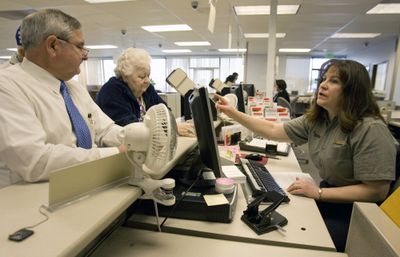Licensing office goes dark
Gregoire seeks 25 closures; legislators balk

OLYMPIA – It’s even more annoying than waiting in line at the Department of Licensing: not having a licensing office at all.
That could soon become reality for cities and towns across the state.
In February, Democratic Gov. Chris Gregoire proposed eliminating 25 of the state’s 66 driver’s licensing offices. It’s part of her plan to eliminate government inefficiency in hard economic times. An Auburn location was the first to go. Offices in Friday Harbor, Seattle’s Greenwood neighborhood and Othello are next, with more to come.
The closures would pose a mild inconvenience for residents in population-dense Western Washington, forcing a cross-town trip or a longer wait in a more crowded office. But for residents on the state’s East Side, the effect would be more dramatic – sometimes requiring a roundtrip trek upward of 100 miles.
People with disabilities, the elderly, and those whose work doesn’t allow travel during business hours would all have difficulty renewing licenses, opponents of the plan say.
Take Oroville, which lies near the Canadian border in the north central part of the state. The town would lose its part-time licensing office, as would Republic to the east, leaving a large swath of the state without service.
“We feel that we’re kinda at the end of the line and this is just going to make us a little more isolated,” said Oroville city clerk Kathy Jones. “I’ll bet you anything that on the West Side you won’t have to go at least 50 miles to get a driver’s license.”
In fact, Eastern Washington would be disproportionately affected by the closures, losing half of its 22 locations, many which are only open a few days a week.
Gregoire has said offices will only be closed in areas that don’t have enough demand to warrant paying the overhead of continued service. In their place, she has proposed expanding office hours at other locations, installing computerized licensing kiosks and shifting more services to the Internet. Nearly 40 percent of license tabs are renewed online already.
This raises the hackles of some lawmakers who say the paltry savings gained by the closures – an estimated $2.6 million during the next two years – don’t outweigh the need for the service. For example, the state would only save $3,300 a year if Friday Harbor’s part-time office is closed as planned, according to the Department of Licensing.
Marty Brown, a policy adviser to Gregoire, indicated the governor has softened her stance on how many offices should be closed this year. A final number will be worked out between the governor and Democratic leaders in the House and the Senate.
The decline of licensing offices is a national trend as states try to streamline government by switching to the Internet in the hope of improving services and shortening lines.